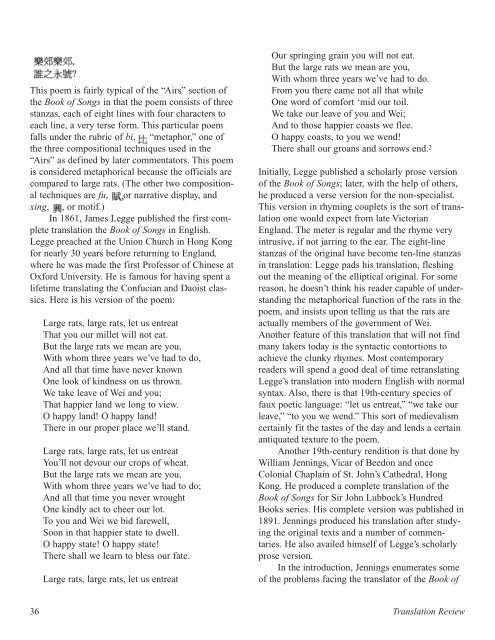Translation Review - The University of Texas at Dallas
Translation Review - The University of Texas at Dallas
Translation Review - The University of Texas at Dallas
You also want an ePaper? Increase the reach of your titles
YUMPU automatically turns print PDFs into web optimized ePapers that Google loves.
≥u±N•h§k,<br />
æA©ºº÷≠•;<br />
º÷≠•º÷≠•,<br />
This poem is fairly typical <strong>of</strong> the “Airs” section <strong>of</strong><br />
the Book <strong>of</strong> Songs in th<strong>at</strong> the poem consists <strong>of</strong> three<br />
stanzas, each <strong>of</strong> eight lines with four characters to<br />
each line, a very terse form. This particular poem<br />
falls under the rubric <strong>of</strong> bi, § , “metaphor,” one <strong>of</strong><br />
the three compositional techniques used in the<br />
“Airs” as defined by l<strong>at</strong>er comment<strong>at</strong>ors. This poem<br />
is considered metaphorical because the <strong>of</strong>ficials are<br />
compared to large r<strong>at</strong>s. (<strong>The</strong> other two compositional<br />
techniques are fu,Ω·, or narr<strong>at</strong>ive display, and<br />
xing, ø, or motif.)<br />
In 1861, James Legge published the first complete<br />
transl<strong>at</strong>ion the Book <strong>of</strong> Songs in English.<br />
Legge preached <strong>at</strong> the Union Church in Hong Kong<br />
for nearly 30 years before returning to England,<br />
where he was made the first Pr<strong>of</strong>essor <strong>of</strong> Chinese <strong>at</strong><br />
Oxford <strong>University</strong>. He is famous for having spent a<br />
lifetime transl<strong>at</strong>ing the Confucian and Daoist classics.<br />
Here is his version <strong>of</strong> the poem:<br />
Large r<strong>at</strong>s, large r<strong>at</strong>s, let us entre<strong>at</strong><br />
Th<strong>at</strong> you our millet will not e<strong>at</strong>.<br />
But the large r<strong>at</strong>s we mean are you,<br />
With whom three years we’ve had to do,<br />
And all th<strong>at</strong> time have never known<br />
One look <strong>of</strong> kindness on us thrown.<br />
We take leave <strong>of</strong> Wei and you;<br />
Th<strong>at</strong> happier land we long to view.<br />
O happy land! O happy land!<br />
<strong>The</strong>re in our proper place we’ll stand.<br />
Large r<strong>at</strong>s, large r<strong>at</strong>s, let us entre<strong>at</strong><br />
You’ll not devour our crops <strong>of</strong> whe<strong>at</strong>.<br />
But the large r<strong>at</strong>s we mean are you,<br />
With whom three years we’ve had to do;<br />
And all th<strong>at</strong> time you never wrought<br />
One kindly act to cheer our lot.<br />
To you and Wei we bid farewell,<br />
Soon in th<strong>at</strong> happier st<strong>at</strong>e to dwell.<br />
O happy st<strong>at</strong>e! O happy st<strong>at</strong>e!<br />
<strong>The</strong>re shall we learn to bless our f<strong>at</strong>e.<br />
Large r<strong>at</strong>s, large r<strong>at</strong>s, let us entre<strong>at</strong><br />
Our springing grain you will not e<strong>at</strong>.<br />
But the large r<strong>at</strong>s we mean are you,<br />
With whom three years we’ve had to do.<br />
From you there came not all th<strong>at</strong> while<br />
One word <strong>of</strong> comfort ‘mid our toil.<br />
We take our leave <strong>of</strong> you and Wei;<br />
And to those happier coasts we flee.<br />
O happy coasts, to you we wend!<br />
<strong>The</strong>re shall our groans and sorrows end. 2<br />
Initially, Legge published a scholarly prose version<br />
<strong>of</strong> the Book <strong>of</strong> Songs; l<strong>at</strong>er, with the help <strong>of</strong> others,<br />
he produced a verse version for the non-specialist.<br />
This version in rhyming couplets is the sort <strong>of</strong> transl<strong>at</strong>ion<br />
one would expect from l<strong>at</strong>e Victorian<br />
England. <strong>The</strong> meter is regular and the rhyme very<br />
intrusive, if not jarring to the ear. <strong>The</strong> eight-line<br />
stanzas <strong>of</strong> the original have become ten-line stanzas<br />
in transl<strong>at</strong>ion: Legge pads his transl<strong>at</strong>ion, fleshing<br />
out the meaning <strong>of</strong> the elliptical original. For some<br />
reason, he doesn’t think his reader capable <strong>of</strong> understanding<br />
the metaphorical function <strong>of</strong> the r<strong>at</strong>s in the<br />
poem, and insists upon telling us th<strong>at</strong> the r<strong>at</strong>s are<br />
actually members <strong>of</strong> the government <strong>of</strong> Wei.<br />
Another fe<strong>at</strong>ure <strong>of</strong> this transl<strong>at</strong>ion th<strong>at</strong> will not find<br />
many takers today is the syntactic contortions to<br />
achieve the clunky rhymes. Most contemporary<br />
readers will spend a good deal <strong>of</strong> time retransl<strong>at</strong>ing<br />
Legge’s transl<strong>at</strong>ion into modern English with normal<br />
syntax. Also, there is th<strong>at</strong> 19th-century species <strong>of</strong><br />
faux poetic language: “let us entre<strong>at</strong>,” “we take our<br />
leave,” “to you we wend.” This sort <strong>of</strong> medievalism<br />
certainly fit the tastes <strong>of</strong> the day and lends a certain<br />
antiqu<strong>at</strong>ed texture to the poem.<br />
Another 19th-century rendition is th<strong>at</strong> done by<br />
William Jennings, Vicar <strong>of</strong> Beedon and once<br />
Colonial Chaplain <strong>of</strong> St. John’s C<strong>at</strong>hedral, Hong<br />
Kong. He produced a complete transl<strong>at</strong>ion <strong>of</strong> the<br />
Book <strong>of</strong> Songs for Sir John Lubbock’s Hundred<br />
Books series. His complete version was published in<br />
1891. Jennings produced his transl<strong>at</strong>ion after studying<br />
the original texts and a number <strong>of</strong> commentaries.<br />
He also availed himself <strong>of</strong> Legge’s scholarly<br />
prose version.<br />
In the introduction, Jennings enumer<strong>at</strong>es some<br />
<strong>of</strong> the problems facing the transl<strong>at</strong>or <strong>of</strong> the Book <strong>of</strong><br />
36 <strong>Transl<strong>at</strong>ion</strong> <strong>Review</strong>

















